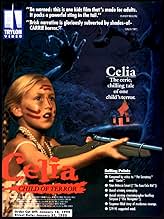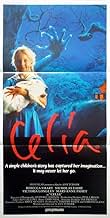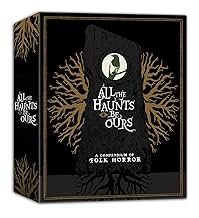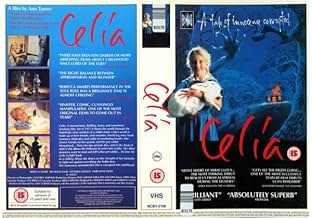IMDb-BEWERTUNG
6,8/10
1729
IHRE BEWERTUNG
Füge eine Handlung in deiner Sprache hinzuAn imaginative and somewhat disturbed young girl fantasizes about evil creatures and other oddities to mask her insecurities while growing up in rural Australia.An imaginative and somewhat disturbed young girl fantasizes about evil creatures and other oddities to mask her insecurities while growing up in rural Australia.An imaginative and somewhat disturbed young girl fantasizes about evil creatures and other oddities to mask her insecurities while growing up in rural Australia.
- Auszeichnungen
- 2 Gewinne & 2 Nominierungen insgesamt
Empfohlene Bewertungen
In summer, 2003, I took a class about Australian cinema. We watched films like "Walkabout", "Gallipoli" and "Rabbit-Proof Fence"; it might have thrown a wrench in the works had we watched "Celia". At the video/DVD store, I found it under the horror section, but it's only a horror flick in the loosest terms. The movie deals with a nine-year-old girl (Rebecca Smart) in 1950s Australia whose amorality and alienation from society drive her to complete madness; I think that that was the plot. Certainly it's ugly what Celia does, but seeing what the adults around her are like, I felt that I had no choice except to root for Celia.
The historical context involves the Cold War and the government's efforts to stop the rabbit infestation. As people tell Celia not to fraternize with children of communists, she grows more and more disenchanted with the world around her - after all, friends are supposed to be friends no matter what the parents' political activity. But when a cop takes away her pet rabbit, she really gets nasty (it also shows that the rabbit-proof fence that lent its name to the 2002 movie clearly didn't work in holding back the leporid plague).
So how to interpret this movie? It looks at face value like one of the many instances of a seemingly cute girl having a not so cute side (think "The Bad Seed"). One might say that the rabbits play a role similar to the ones in "Night of the Lepus" and "Donnie Darko", even though Celia's rabbit doesn't do anything. I guess that it's worth seeing, if only once.
The historical context involves the Cold War and the government's efforts to stop the rabbit infestation. As people tell Celia not to fraternize with children of communists, she grows more and more disenchanted with the world around her - after all, friends are supposed to be friends no matter what the parents' political activity. But when a cop takes away her pet rabbit, she really gets nasty (it also shows that the rabbit-proof fence that lent its name to the 2002 movie clearly didn't work in holding back the leporid plague).
So how to interpret this movie? It looks at face value like one of the many instances of a seemingly cute girl having a not so cute side (think "The Bad Seed"). One might say that the rabbits play a role similar to the ones in "Night of the Lepus" and "Donnie Darko", even though Celia's rabbit doesn't do anything. I guess that it's worth seeing, if only once.
Celia is a 9 year old girl with a lot of imagination. She lives with her family in South Australia in the fifties. She has a strong will, lots of charm and wit. Her family are communists, which makes them kind of outcasts in the society, and Celia has to fight mobbing schoolmates as well as discriminating teachers. She manages to do that very well. All this gives a rather frank and funny description of childhood problems, and Rebecca Smart plays her part extremely well. But Celia is not just a charming kid - when she hates, she really hates. And when she fantasizes about mysterious evil animals, she can't quite distinguish fantasy from reality. Which might seem rather normal, but Celia lives in a house, where a loaded gun is available... This movie is very entertaining, giving a varied picture of growing-up - and one can really feel the emotions and confusions, which is a part of being nine years old. At times the film becomes perhaps a bit too confusing - it can be quite difficult to follow the girls vivid imagination. But I'll guess, you have the same problem in the real world...
It is with a heavy heart that I note Celia, possibly my favourite film, is now being marketed with a tacky subtitle. This film is comparable to Jane Campion's work and is anything but a straight horror film, with a subtle characterisation and a compassionate yet unsentimental picture of childhood not generally associated with that genre. The narrative viewpoint is well sustained, with the grownup world of barbecues, blacklists, and affairs observed from a child's angle. The horror in question is in Celia's imagination, which, like that of all children, plays out the stresses of her own family and her culture. Various plagues - literal and metaphoric - impinge on her world, from myxomatosis to communism. Fans of blood and gore will be disappointed. The film is an unhurried portrait of 50s Australia, the pressure to conform, childhood, death. Its climax is sharp and bloody but logical; as is the lightness of the ending. As a touchstone, think of the daughter in the Piano, with her outrageous storybook lies, her spontaneity, her hurt rebellion, and her ultimate childishness. Just don't think Carrie. This is gem of a film, and let's face it, Hollywood churns out a lot of disappointing ones. As soon as you see the opening titles with Rebecca Smart's expressive face glancing all around her, while the theme music plays, you'll realise you're in the hands of a very talented director.
A very strange film that has been included in the, All the Haunts be Ours, compendium of 'folk horror' which is really what this is. There is and plenty that looks like a children film but it clearly is not that right and even at the early there are moments of 'horror'. I understand that in the video store people wanted to make clear that 'children' should not be allowed and then if as people are hope it will be gore and sex and maybe vampires, there is another problem. So lets just face this that children are in the film and realise that they do not always see the way we always do. The child, Celia is most imaginative and can influence other children and this can make it difficult for them. The film also has the killing rabbits, the communists, cruel parents and police men and school teachers who can be even more so.
Celia is a spirited 9 year old girl with a vivid imagination.
Reeling from the death of her beloved grandmother, she seeks out the company of her new neighbours, The Tanners - a warm and loving family harbouring a secret.
Set in an Australian suburb in the late 1950's, the film tackles the prevailing social issues of the time including the "red scare" and the "rabbit pestilence", drawing a parallel between the two.
The film is essentially a drama, but with an added element of dark fantasy (which, although an interesting idea, is used inconsistently and often feels out of place).
But as a coming of age story, Celia is a triumph - an honest and unvarnished exploration of the trials and tribulations of childhood, featuring an astonishing performance by Rebecca Smart in the titular role.
Reeling from the death of her beloved grandmother, she seeks out the company of her new neighbours, The Tanners - a warm and loving family harbouring a secret.
Set in an Australian suburb in the late 1950's, the film tackles the prevailing social issues of the time including the "red scare" and the "rabbit pestilence", drawing a parallel between the two.
The film is essentially a drama, but with an added element of dark fantasy (which, although an interesting idea, is used inconsistently and often feels out of place).
But as a coming of age story, Celia is a triumph - an honest and unvarnished exploration of the trials and tribulations of childhood, featuring an astonishing performance by Rebecca Smart in the titular role.
Wusstest du schon
- WissenswertesThe fairy tale from which extracts were recited in the film was The Hobyahs by James H. Fassett and Robert D. San Souci.
- PatzerThe burn mark on Celia's rabbit is missing at the fishing docks.
- VerbindungenFeatured in Film Review and Interview with Ann Turner from the 'Sunday' Show (1989)
Top-Auswahl
Melde dich zum Bewerten an und greife auf die Watchlist für personalisierte Empfehlungen zu.
- How long is Celia?Powered by Alexa
Details
- Erscheinungsdatum
- Herkunftsland
- Offizielle Standorte
- Sprache
- Auch bekannt als
- Celia - Eine Welt zerbricht
- Drehorte
- Produktionsfirma
- Weitere beteiligte Unternehmen bei IMDbPro anzeigen
- Laufzeit
- 1 Std. 42 Min.(102 min)
- Sound-Mix
- Seitenverhältnis
- 1.85 : 1
Zu dieser Seite beitragen
Bearbeitung vorschlagen oder fehlenden Inhalt hinzufügen
























